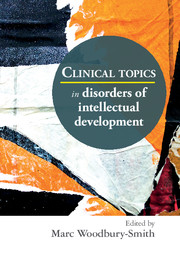Book contents
- Frontmatter
- Contents
- List of contributors
- Foreword
- Preface
- Part 1 Disorders of intellectual development: concept and epidemiology
- 1 Disorders of intellectual development: historical, conceptual, epidemiological and nosological overview
- 2 Behavioural phenotypes
- Part 2 Disorders of intellectual development: comorbidity and complications
- Part 3 Autism spectrum disorder
- Part 4 Service provision
- Index
1 - Disorders of intellectual development: historical, conceptual, epidemiological and nosological overview
from Part 1 - Disorders of intellectual development: concept and epidemiology
Published online by Cambridge University Press: 01 January 2018
- Frontmatter
- Contents
- List of contributors
- Foreword
- Preface
- Part 1 Disorders of intellectual development: concept and epidemiology
- 1 Disorders of intellectual development: historical, conceptual, epidemiological and nosological overview
- 2 Behavioural phenotypes
- Part 2 Disorders of intellectual development: comorbidity and complications
- Part 3 Autism spectrum disorder
- Part 4 Service provision
- Index
Summary
There are different ways of thinking about the needs of people with disorders of intellectual development (DID); each has its place and none is perfect. The aim of this chapter therefore is to provide an overview of the various perspectives that those working in this field may use to orient themselves to the issues. In clinical practice, when seeing someone who has been referred, the starting point is to ask the question: What am I being asked to do? For the paediatrician and/or geneticist it may well focus on identifying whether a single major cause for a child's developmental delay can be identified. For a psychiatrist, clinical psychologist or community nurse it may be about identifying the reasons for, and treatment of, a particular constellation of problem behaviours. The task, through history taking, observation, examination and investigation, is to arrive at an understanding – a formulation – that then informs intervention through the integration of information about the individual within an accepted theoretical and conceptual framework that has been developed through research.
While DSM-5 uses the term ‘intellectual developmental disorders’ (American Psychiatric Association, 2013), the term generally used in this book is the one due to be used in ICD-11: ‘disorders of intellectual development’. It is the latest in a long line of labels that have included a range of unacceptable and derogatory terms, from idiot, imbecile, feebleminded and moral imbecile to mentally retarded, mentally handicapped and mentally subnormal, and, more recently, learning disabled and intellectually disabled. Many of these terms were incorporated into laws, such as the Mental Deficiency Act 1913 in England. At that time, a method of classification was considered to be necessary to make possible the segregation of people whom science had deemed to be harmful to the population as a whole and a major source of criminality (Goddard, 1912). However, despite this inauspicious past, there have been substantial positive changes in the way society as a whole perceives and wishes to engage with people with DID, and with this there have also been changes in almost every aspect of the lives of these individuals, with a focus on community inclusion and support.
- Type
- Chapter
- Information
- Publisher: Royal College of PsychiatristsPrint publication year: 2015



